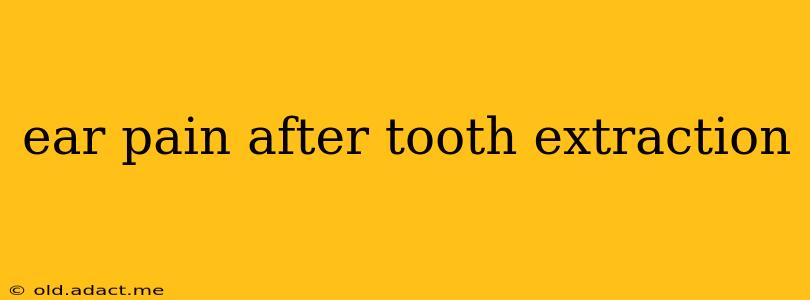Experiencing ear pain after a tooth extraction is more common than you might think. While it might seem unrelated, the proximity of teeth to the ear and the intricate network of nerves and tissues in the jaw can easily lead to referred pain. This comprehensive guide will explore the causes, treatment options, and preventive measures for ear pain following tooth extraction.
What Causes Ear Pain After Tooth Extraction?
The most common reason for earache after a tooth extraction is referred pain. This happens because the nerves in your jaw and teeth share pathways with those supplying the ear. Inflammation, swelling, or irritation near the extraction site can trigger pain signals that your brain interprets as originating from your ear.
Specific Causes:
- Inflammation and Swelling: Post-extraction swelling is a normal part of the healing process. However, significant swelling can put pressure on surrounding nerves, causing pain to radiate to the ear.
- Infection: A bacterial infection at the extraction site can also cause significant pain, potentially spreading to the ear. Symptoms of infection might include increased pain, swelling, redness, and pus.
- Dry Socket: This painful complication occurs when the blood clot protecting the extraction site dislodges, exposing the underlying bone. This can lead to intense pain radiating to the ear and jaw.
- Sinus Infection: Upper teeth are close to the sinuses. If a tooth extraction impacts the sinuses, it might lead to a sinus infection, which can present as ear pain, along with facial pressure and congestion.
- Nerve Damage (Rare): In rare instances, the extraction procedure could cause damage to a nerve, resulting in persistent pain in the ear, jaw, or other areas.
Why Does My Ear Hurt After a Tooth Extraction? (Addressing a common PAA question)
As mentioned above, the most likely culprit is referred pain. The intricate network of nerves in your jaw and facial area means that pain originating from one location (the extraction site) can be felt in another (your ear). The intensity and duration of this referred pain vary from person to person. It's crucial to consult your dentist if the pain is severe, persistent, or accompanied by other concerning symptoms.
How Long Does Ear Pain After Tooth Extraction Last? (Another common PAA question)
The duration of ear pain after a tooth extraction varies depending on the individual and the underlying cause. In most cases, the pain is mild and subsides within a few days as the swelling reduces. However, if the pain is severe or persists for more than a week, it's crucial to seek professional dental care.
How to Treat Ear Pain After Tooth Extraction?
Treatment focuses on addressing the underlying cause. Most cases of mild ear pain can be managed with home remedies:
- Over-the-Counter Pain Relievers: Ibuprofen or acetaminophen can effectively reduce pain and inflammation. Always follow the recommended dosage.
- Ice Packs: Applying ice packs to the cheek near the extraction site can help reduce swelling and pain. Apply ice for 15-20 minutes at a time, several times a day.
- Rest: Adequate rest allows your body to focus on healing.
- Saltwater Rinses: Gentle saltwater rinses can help keep the extraction site clean and prevent infection.
When to See a Dentist (Addressing a PAA question)?
Seek immediate dental attention if you experience:
- Severe or persistent ear pain: Pain that doesn't improve with over-the-counter pain relievers.
- Signs of infection: Increased swelling, redness, pus, or fever.
- Difficulty swallowing or breathing.
- Numbness or tingling in your face or jaw.
Ignoring these symptoms could lead to more significant complications.
How to Prevent Ear Pain After Tooth Extraction?
While you can't always prevent referred pain, following your dentist's post-operative instructions diligently can significantly minimize your risk:
- Follow post-operative instructions meticulously.
- Avoid smoking, as it hinders healing and increases infection risk.
- Maintain good oral hygiene.
- Eat soft foods initially to avoid irritation.
- Avoid strenuous activities that could increase blood flow and swelling.
This information is for educational purposes only and should not be considered medical advice. Always consult your dentist or oral surgeon for any concerns about your oral health. They can provide a proper diagnosis and create a personalized treatment plan.
